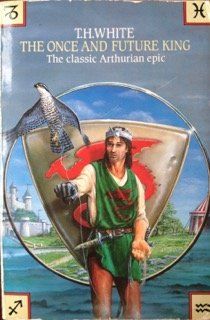A touch of medical humanity
By Dr Louise Freeman
Merlyn is speaking to the Wart (the future King Arthur but he doesn't know this yet) who is miserable because Kay is going to be a knight and he isn’t.
"The best thing for being sad,” replied Merlyn, beginning to puff and blow, “is to learn something. That is the only thing that never fails. You may grow old and trembling in your anatomies, you may lie awake at night listening to the disorder of your veins, you may miss your only love, you may see the world about you devastated by evil lunatics, or know your honour trampled in the sewers of baser minds.There is only one thing for it then - to learn. Learn why the world wags and what wags it. That is the only thing which the mind can never exhaust, never alienate, never be tortured by, never fear or distrust, and never dream of regretting. Learning is the thing for you. Look at what a lot of things there are to learn - pure science, the only purity there is. You can learn astronomy in a lifetime, natural history in three, literature in six. And then, after you have exhausted a milliard lifetimes in biology and medicine and theo-criticism and geography and history and economics - why, you can start to make a cart-wheel out of the appropriate wood, or spend fifty years learning to begin to learn to beat your adversary at fencing. After that you can start again on mathematics, until it is time to learn to plough."
The Sword in the Stone
by T. H. White
T. H. White knew what he was talking about as someone who was intermittently very sad himself.
T. H. (Terence Hanbury but known as Tim) White was born in 1906 to a couple whose parenting skills would surely call for social service intervention in the 21st century. He was told by an aunt of an episode when he was a baby in which his parents were arguing (with a gun) over his cot as to which of them was going to kill him and themselves. His parents divorced when he was 14 leading to financial straits with White having to support himself through university. He had a brilliant educational career in which his Cambridge tutors were so impressed with him that they even subscribed to a fund collected to send him to warmer climes to recuperate from TB. His first book of poetry was published when he was still an undergraduate. Tim White taught English for a few years, latterly at Stowe, before leaving the conventional world of employment to live as a writer. Tim White struggled with his sexuality throughout his life and there is now an assumption that he was homosexual although there is no evidence of any sexual relationships with men or women. His closest relationships seem to have been with his dogs - he owned a series of Irish setters to whom he was devoted. Tim tried several of the then commonly accepted ‘treatments’ for homo-sexuality including therapy and medication. He seems to have been an exciting but possibly challenging friend, likely to arrive late at night with an armful of books which one ’must’ read. The novelist, David Garnett, was met when coming to stay on holiday, in a car with two peregrine falcons perched on a makeshift bar across the back seat. David was told not to lean too far back during the journey and spent the trip nervously hunched forwards with an Irish setter on his knee.
Tim metamorphosed from a passionate, hunting, shooting, fisherman to a committed pacifist in his later years. Never one to care about money, he nevertheless had a few wildly successful books of which The Sword in the Stone
is now the best known from an oeuvre of over twenty works including fantasy, poetry and reminiscences of country life. It was adapted as the musical Camelot
in 1960 which led to friendship with Hollywood stars and an increased profile in the States. White died at only 58 (having not looked after himself very well) while on a Mediterranean trip and is buried in Athens.

